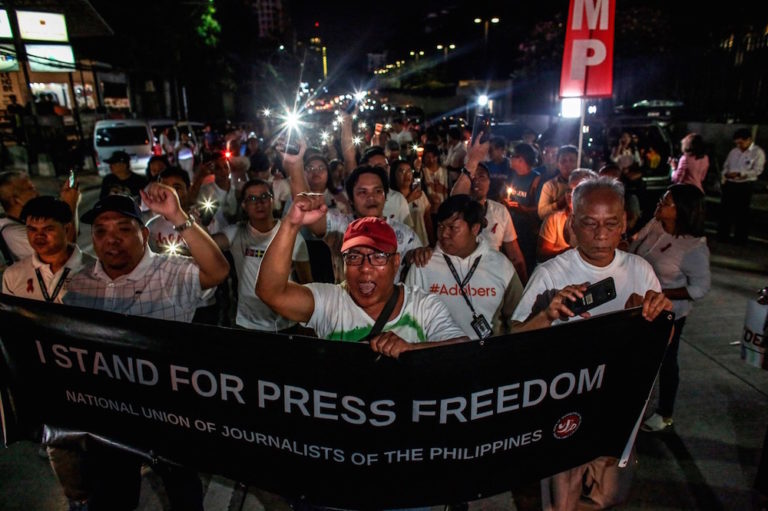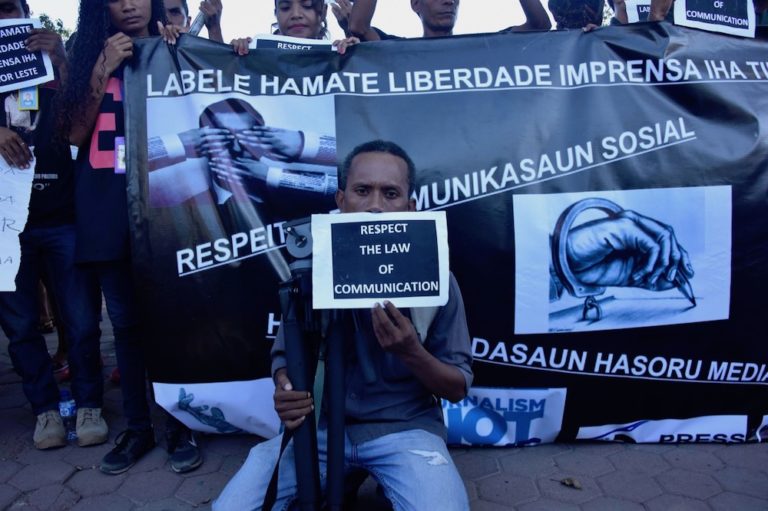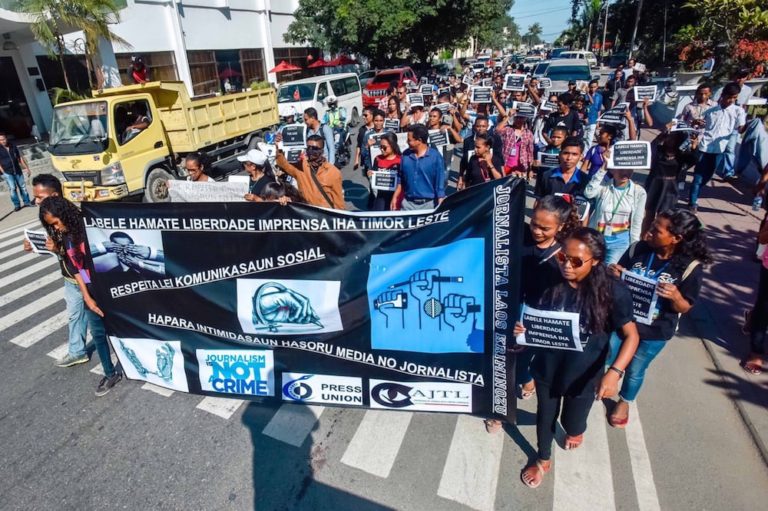(AJI/IFEX) – The following is a 9 September 1999 AJI statement: AJI URGES REVOCATION OF MARTIAL LAW IN EAST TIMOR The imposition of martial law in East Timor, in place since 7 September, is unacceptable, whatever the reason. President Habibie’s logic in imposing martial law, at first glance, does make sense. The situation is grave, […]
(AJI/IFEX) – The following is a 9 September 1999 AJI statement:
AJI URGES REVOCATION OF MARTIAL LAW IN EAST TIMOR
The imposition of martial law in East Timor, in place since 7 September, is
unacceptable, whatever the reason. President Habibie’s logic in imposing
martial law, at first glance, does make sense. The situation is grave, and
the police are unable to bring it under control. However, the fact is that
the violence and brutality have not halted. Rather, Bishop Nascimento has
been wounded and evacuated to the forest. Timtim now rests in the hands of
the military rulers.
By definition, martial law denounces press freedom in particular, and human
rights in general. Under martial law, military rulers are given the power to
control the media, decide what news can be reported and what cannot, and
journalists’ room to move is restricted. Telecommunications equipment also
reverts to military control, and journalists, as with other civilians, can
be arbitrarily detained.And as it happens, martial law in East Timor has now
proved a disaster for the journalistic world: a number of journalists have
disappeared, reportedly arrested by the military.
Peter Rohi, 57, the executive editor of the afternoon daily “Suara Bangsa”
has disappeared since Tuesday, 7 September. The final contact between Peter
and Jakarta occurred on Tuesday morning, and to date there has been no
further word from him. Other missing journalists are Mindo Radjagoekgoek,
34, a contributor to ‘Radio Nederland’, Tri Agus Siswowihardjo, 33, an AJI
member who contributes to a number of media, and Joaquim Rohi, 25, a
freelance journalist. Also missing are a number of volunteer poll monitors:
Yenny Rosa Damayanti, 34, KIPER coordinator, Adi Pratomo, 28, a student and
member of KIPER operational division staff, Anthony Listianto, 32, KIPER
volunteer and Jakob Rumbiak, also a KIPER volunteer. Ironically, the
disappearance of these journalists and volunteers took place under martial
law. A number of sources have informed AJI that they were apprehended by the
military. More worrying is that under martial law, where access to
information is closed and censored, the fate of these people is even more
unclear.
As such, the Alliance of Independent Journalists demands:
1. That the authorities, particularly the security forces, determine the
whereabouts and condition of the missing journalists and activists,
guarantee their safety, and release them.
2. That martial law in East Timor be revoked, as it violates human rights
and press freedom, and places civilians, including journalists, in greater
danger.
3. That the Habibie government choose between two options: first, return
responsibility for security to the police, as specified in the New York
Agreement (5 May 1999). However, the police must then undertake their task
in a professional manner, for instance apprehending all perpetrators of
violence and brutality, without exception. This includes the leaders of the
armed militia groups, who are responsible for the violence and brutality of
their groups’ members. The police must also seize the militias’ arms, which
clearly constitute a threat to civilians, including journalists. Or,
alternatively, if the police are deemed unable to undertake this very simple
task, then the Indonesian government must invite the United Nations to
establish a peacekeeping force in East Timor.
4. That the Indonesian government and all its state apparatus cooperate with
the entire nation and international community to restore security, stability
and peace in East Timor, and assist in the establishment of East Timor as a
sovereign nation.
5. That Indonesian society not be deceived by the manipulation of public
opinion being attempted by a number of groups, who wish to transform the
brutality in East Timor into a matter of narrow-minded nationalism.
Nationalism relates to the nation’s sovereignty, but it also relates to our
nation’s prestige. Any action that lowers our standing and self-respect as a
civilised nation, and which allows, even supports, the brutality in East
Timor is an anti-nationalist stance.
Finally, the Alliance of Independent Journalists must appeal: restore
security and peace in East Timor to salvage the nation’s prestige.
Jakarta, 9 September 1999
Ging Ginanjar
Coordinator, Advocacy Division


